“What if I told you” … that it’s crazy who you might end up agreeing with?
Remember this video that went viral called “Why I Hate Religion but Love Jesus” by Jefferson Bethke? Of course you do, you haven’t got a chance to repress it yet. But in case you have closed your Facebook account as a New Year’s resolution, here it is:
Confession: When I first clicked on it, I was a bit excited, cool background, cool typography, cool dude, then after 30 seconds I thought “Uh oh, this is not cool. It’s not even accurate.”
Thought of blogging about it, but by the time I collected my thoughts, I had already seen this excellent one “Lame Poetry, False Dichotomies, and Bad Theology” by Jonathan Fitzgerald on the Patrol Mag site and there were a few others floating around Twitter.
Tony Jones had a few scattered comments about it on his FB and this post.
Kevin DeYoung had a lot to say here.
Then about a week later I saw on Twitter that Bethke responded to Kevin’s critique and his comments were included in a follow-up post by Kevin.
Before I read the post I thought – wow, when Tony Jones and Kevin DeYoung agree, you know your theology really sucks. I pictured neo-reformers putting down their Calvin’s Institutes, complimentarians putting down their Real Marriage books and the husbands giving permission to allow their wives “extra time” to look online (sorry I couldn’t resist), progressives stopped tweeting about the GOP Debates (they’re really the only ones watching) and they all nodded in sad agreement – “The message of this video is terrible.”
No word yet on how Rob Bell and John Piper felt about the whole thing. I picture Rob in Hollywood creating characters for his new tv show. I bet you one is called “Joe Pipper” and he’s from Minnesota and he’s a cross between Robert Duvall’s character, “Sonny” in The Apostle and Simon Cowell. I’m also starting the rumor that John Piper has contacted Flannel to produce a series of DVD’s called, “Righteous O’rgh” (which is the Greek for “anger”, like in Mark 3:5. Could have gone a different tray with this joke, patting myself on the back for such restraint ;)
As you know, the respective sides have not agreed on much over the years. Guinness, iPhones and the continued desire to breath oxygen are some common denominators but I am aware there are tea-totaling Droid users in the respective parties.
But I digress.
The issue that everyone pointed out was that we all hate hypocrisy. “Religion” isn’t the problem. Heartless, cold, empty religion is what causes the damage. Bethke sorta admits to that in this CBS News video (although he plays the “semantics card” a little awkwardly IMO). You should click this to hear the priest use spoken word in response. (“Yo Jeff, let me give you a holler from the collar. I don’t think it’s religion you should be dissin’. I think it’s the nuance that you’re missing” – Not quite the battle from 8-Mile but what can you do).
So here’s where I find myself in light of this little episode. I was grateful for what Kevin DeYoung said. I was grateful that Tony Jones posted about it. I know some will see this as a common enemy thing and while bad theology is a good common enemy, this little scene demonstrated revealed that we could look at the same sky and say it was blue. Or look at a piece of art and say, “Hmmm, not sure the artist got it here.” I want to be careful and taper off the “There’s hope after all for the unity of the Church!” conversation but from my vantage point, this was good for me to see.
I am also grateful overall for Bethke’s response. For a 22 year old, I’m excited for him. I hope this ushers in a season of study and thoughtful engagement with a number of aspects conceding the nature of worship, faith, religion, theology and the church. I hope he leverages his influence to build the church. And I hope his next video is grounded theologically and brings a better conversation to the social media culture.
What if I told you we all do could this?
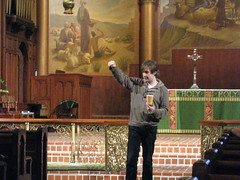 Peter Rollins and John Franke was fantastic. Pete gives quite a performance. He speaks pretty fast in a thick Irish accent, uses his hands, quotes everyone from Nietzsche and Bonhoeffer, uses parables, recites stories, employs hyperbole, and chugs coffee.
Peter Rollins and John Franke was fantastic. Pete gives quite a performance. He speaks pretty fast in a thick Irish accent, uses his hands, quotes everyone from Nietzsche and Bonhoeffer, uses parables, recites stories, employs hyperbole, and chugs coffee. 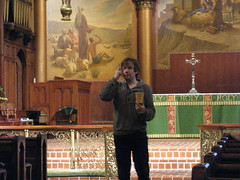 – “… God becomes the crutch to save us from the abyss”
– “… God becomes the crutch to save us from the abyss”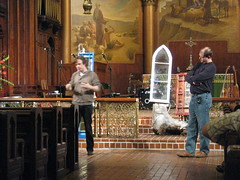
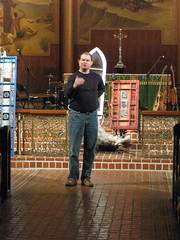
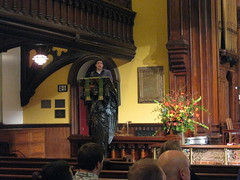 As mentioned, it really was a great day. I’ve expressed gratitude in other posts but I look forward for
As mentioned, it really was a great day. I’ve expressed gratitude in other posts but I look forward for 
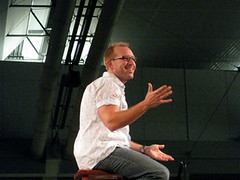 Tony talked about his life starting in his senior year of
Tony talked about his life starting in his senior year of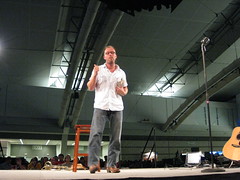
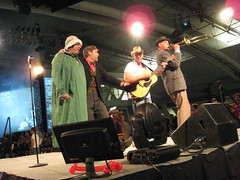 ere very helpful for me like many others.
ere very helpful for me like many others. 




Recent Comments